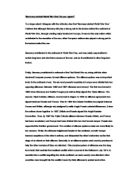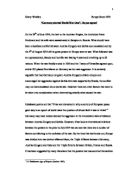Until the late nineteenth century, Morocco had been part of the Turkish Ottoman Empire, but then became increasingly under the influence of France. Germany provoked a crisis in Morocco when it took actions to challenge French economic dominance in the area, to protect its own interests in the country. In January 1905, the German Kaiser arrived at Tangier, a leading Moroccan port, demanding equal treatment for German traders and an international conference to settle trading rights in Morocco. This example of the Kaiser’s provocative diplomacy during the crisis alarmed both Britain and French leaders, heightening their fears about Germany’s aggressive ambitions in Europe.
Between 1908 and 1914, naval rivalry was a major source of tension between Germany and Britain. The Kaiser’s decision to create a world-class German navy, led to a second crisis, as Germany became engaged in a frantic navy rivalry with Britain, who were determined to challenge Germany’s confrontational policy. The central issue of the naval race was the production in both countries of new ‘unsinkable’ battleships, known as dreadnoughts. As the naval race intensified, tensions and further divisions were created between the two nations, as both Britain and France became increasingly more suspicious of Germany’s world policy.
In May 1911, a Germany instigated a third crisis in response to French troops helping the sultan of Morocco to crush a nationalist revolt in Fez. Germany perceived the arrival of French troops in Morocco as a pretext for French annexation of the territory, and in July 1911 sent a German gunboat, The panther, to Agadir, with the aim of gaining trading concessions from the French. However, the French refused and forced The Panther to withdraw from the area. The Agadir crisis has been perceived by historians as one of the most crucial events in the years that led to the outbreak of the First World War. It drew Britain and France closer to oppose the German threat. It highlighted how France would no longer back down in diplomatic disagreements with Germany, unlike in the previous Moroccan crisis of 1905. Germany was now in a very weakened diplomatic position. These last two consequences of the crisis made it highly unlikely that either power would face the humiliation of backing down in a future European crisis, thus, increasing the likelihood of war.
Germany also played a strong part in the causation of the war as its support for Austria-Hungary in its dispute with Serbia in July 1914 has been viewed as a crucial factor in the outbreak of World War One. Orthodox historians argue that Austria-Hungary would not have waged war on Serbia in July 1914, if it had not have received the support of the German Kaiser. This is supported by the fact that the Austrian Emperor, Franz Josef I, asked the German Kaiser for his support in dealing with Bosnia on 4th July 1914, and only took action against Serbia after the Kaiser had announced his unconditional support. This is seen as an important factor because the dispute between Bosnia and the Habsburg Empire escalated into the First World War, and if Germany had not offered its support, Austria-Hungary may not have took action against Serbia, and World War One may not have occurred.
All of these short-term factors initiated by Germany, played a major role in the outbreak of the war, as they brought the countries of the Triple Entente together, united by their suspicions of the Kaiser’s ambitions. Thus, making it more likely that if a country was attacked, that their allies would intervene in the war, therefore, geographically expanding a future conflict.
Therefore, it is evident that Germany did play a major role in the outbreak of World War One in July 1914. This is because it was involved with both major long-term, underlying factors, which created tensions in Europe, and in short-term factors, which heightened European tensions, enforcing and escalating previous tensions and divisions, contributing to the deeply unstable European environment which resulted in the outbreak of World War One.
However, Germany was not solely responsible for the outbreak of war in 1914, as their were other long-term and short-term causes of tension in Europe which Germany was not involved with.
Balkan nationalism was a cause of the major long-term cause of tension in Europe, and was one of the most dangerous causes of friction. It created many crises, which served to heighten tension, and was the factor behind the immediate short-term event that triggered off the war.
Serbia had ambitions of uniting all Serbs and Croats in a South Slav kingdom. This caused tensions as it would involve taking territory from Austria-Hungary and if the Serbs and Croats achieved independence, many of the other ethnic groups under Austria-Hungary rule would also demand independence. Which inevitably would cause the demise of the Habsburg Empire. Suspicion and tension were created in Europe as Serbia attempted to unite its people, and as Austria-Hungary tried to prevent Serbia from becoming strong enough to destroy its empire. The long-term battle between Serbia and Austria-Hungary created many short-term diplomatic crises which contributed to the outbreak of war.
The first crisis Bosnian nationalism produced took place between 1908-1909. In October 1908, Austria-Hungary annexed the province of Bosnia-Herzegovina, located in the Balkans, in an attempt to prevent the growth of Serbian nationalism in the region. This created tensions in Europe as it angered the people of the Balkans, who were seeking independence, and their ally, Russia, who supported Serbia. The incident made Russia more determined to increase defence expenditure, in order to prevent further Austria-Hungarian intervention in the Balkans in the future.
Balkan nationalism also caused tensions between 1912-1913 when two wars broke out between rival powers in the Balkans, most notably Albania, Macedonia, Serbia, and Bulgaria, all competed for dominance of the region. The growth of Serbian power which resulted from their victory in these wars greatly added to the tensions in continent, and increased European instability. The growing power of Serbia alarmed Austria-Hungary because as Serbia’s status increased it became more likely that it would eventually gain the power to unite all Serbian people, and cause the downfall of its empire. Therefore, the Austro-Hungarian government decided it would have to deal with Serbia, and by 1914 was looking for an excuse to crush Serbia. With Serbia in close alliance with Russia, and Austria-Hungary allied with Germany, there was a definite prospect that a future Balkan Conflict could escalate into a war engulfing the whole of Europe.
Balkan Nationalism was the long-term factor behind the final crisis in Europe which catalysed the outbreak of the First World War. On June 28th 1914, the heir to the Austrian throne, Archduke Ferdinand, was assassinated in Sarajevo. His assassin was a Bosnian Terrorist, who had close links to the Black Hand, a Serbian terrorist group. Although there was no hard evidence that the assassin was acting under orders from the Serbian government, Austria blamed Serbia. Because of previous tensions, the Austrian government decided to use the assassination as an opportunity to eliminate the power of Serbia. On 23 July 1914, Austria sent the Serbian government an ultimatum, demanding they allowed the Austrian police to arrest all members of anti-Habsburg terrorist groups. When the Serbian government declined, Austria-Hungary declared war on Serbia. What was intended as a strictly limited war between the accuser, Austria-Hungary, and the accused, Serbia, rapidly escalated into a conflict engulfing the whole continent.
Thus, it was a culmination of complex long-term and short-factors which led to the outbreak of war in July 1914. Short term causes or international crises; the Moroccan Crisis, the Anglo-German Naval Rivalry, the Agadir Crisis, the Bosnian Wars, the Bosnia Crisis, and the assassination of the heir to the Austrian throne, all gradually built upon the tensions and enforced the divisions and suspicions which already existed between the countries of Europe, created by the long term factors, the most prominent being: Germany’s aggressive foreign policy, Bosnian Nationalism, and the formation of alliances. Which all culminated to produce a deeply unstable European environment which inevitably erupted into a World War.
In conclusion, World War One was the product of an unstable European environment, created by the combination of a number of short-term and long-term causes. Germany evidently played a major part in the outbreak of World War One, as it solely created many of the long-term and short-term causes of tension. However, responsibility for the war cannot be assigned to Germany alone, as the conflict would not have occurred through Germany’s actions alone; tensions and divisions already had to exist between the European powers for the actions of Germany to cause so much tension, and help to create a World War.
Word Count: 1,953
Bibliography:
The Origins of the First World War; Annika Mombauer (Britain, 2002)
Helmuth Von Moltke and The Origins of the First World War; Annika Mombauer (Cambridge,
2001)
The Origins of the First World War; Gordon Martel (London, 1996)
The Origins of a Tragedy; Samuel R. Williamson Jr. (Missouri, 1981)
The Outbreak of the First World War; Dwight E. Lee (USA, 1975)
The Outbreak of the First World War; David Stevenson (New York, 1997)
The Origins of the First World War; James Joll (London, 1992)






